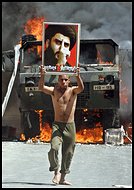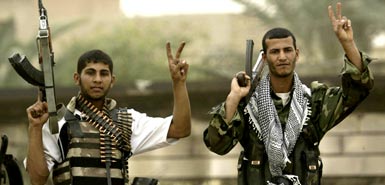Sadr City Turns Ugly
Violence in Sadr City Embitters Both Sides
To the soldiers inside the armored vehicles ringing with the sound of bullets, the night was one long ambush. It began with a sneak attack — rocket-propelled grenades fired from an alley, shredding Humvees and the Americans inside — then quickly escalated into a nightlong firefight. The battleground was the vast warren of narrow streets called Sadr City, but it suddenly reminded 1st Lt. Dave Swanson of Mogadishu.
“As soon as we came into the city, it’s like the whole place came alive with fire,” Swanson said of his arrival, in a 1st Cavalry Division Bradley Fighting Vehicle, in a district he used to regard with the arm’s-length affection of a cop on the beat.
“In our minds, it totally changes our opinion about how we think about this area,” said Swanson, from Owensville, Ohio. “In a day, we went from a humanitarian mission to combat. It’s just amazing that the kids I talked with two, three days ago are the same ones that are throwing the rocks at us as hard as they can.”
The people of Sadr City were no less amazed. When American tanks first rolled in a year ago, it was to the rhythmic cheers of the neighborhood’s poor Shiite Muslim residents.
“When the Americans came, we applauded. We were giving the thumbs-up. We were jumping and shouting. I took a picture of Saddam Hussein and stomped on it,” said Iqbal Jabbar, 38.
This is, unfortunately, the face of stabilization operations. The rapid turning of ostensible friends into enemy combatants seems to happen out of the blue. This is especially the case when competing ethno-religious groups have long-repressed grievances.
7 U.S. Servicemen Killed in Recent Fighting in Iraq
Fighting across Iraq continued escalating Tuesday with military spokesmen announcing the deaths of seven more U.S. soldiers over the past 24 hours.
Among the fatalities were four U.S. Marines assigned to the area around the flashpoint city of Fallujah, where a force of over a thousand coalition-led troops mobilized for the mission of restoring coalition authority in what was once a “no-go” city for Americans, and capturing the killers last week of four civilian contractors.
***
The fighting since the weekend represents the fiercest combat in Iraq since the U.S. announced an end to combat after Baghdad fell last year.
In Sadr City, the Baghdad stronghold of Shiite Muslim cleric Moqtada Sadr, there were unconfirmed reports broadcast by CNN of a number of Iraqi deaths as a result of fighting.
It appears reinforcements are on the way: War Policy: Generals in Iraq Consider Options for More Troops [RSS]
American commanders in Iraq are developing contingency plans to send more American forces to the country if the situation worsens, and administration officials said Monday that the new surge of violence by Shiites represented a worrying challenge to their plans to turn over power in less than 90 days.
President Bush, speaking in Charlotte, N.C., said he intended to stick to the June 30 date for giving control of the country to an interim Iraqi government, even as he conceded that the new government’s structure had not been settled. He vowed that the violence — which he said was being instigated by Moktada al-Sadr, a young Shiite cleric — would be put down, saying, “We just can’t let it stand.”
Mr. Bush appeared eager on Monday to dispel any thought that the new wave of attacks on American forces, in which Shiites as well as Sunnis have now joined, would shake his resolve. “If they think that we’re not sincere about staying the course, many people will not continue to take a risk toward — take the risk toward freedom and democracy,” he told reporters.
The June 30 deadline has long seemed optimistic, especially since we still apparently haven’t figured out exactly who it is we’re turning things over to and what the status of our forces will be under Iraqi sovereignty. In any case, it’s hard to imagine they’ll be ready to govern themselves in less than three months. Still, grandstanding like this isn’t helping, either:
“We can’t allow this to continue,” Mr. Kerry said, meeting with reporters on Monday. “There has to be a political, diplomatic solution which, regrettably, this administration seems stubbornly determined to avoid.”
He called the absence of Arab neighbors as part of the stabilization force “staggering,” saying, “All have a major stake in not having a failed Iraqi state, no matter how they feel about our getting there.”
“I think the president owes it to the American people to explain who we’re turning over sovereignty to and how on June 30th and what is the security plan for after June 30th,” Mr. Kerry concluded.
Given Kerry’s rather muddled message on Iraq when all he had to do was vote up or down on bills, all the while he was campaigning to be Bush’s replacement as commander-in-chief, perhaps he should tell us what it is he’d do rather than issue platitudes.
Update: Citing a passage deeper into the first WaPo story above, Glenn Reynolds proclaims the revolt “overrated.”
“Mahdi Army! They’re not an army!” Officer Haider Raheem said of the unemployed young men who took over one station by brandishing grenades. “They’re a bunch of looters.” Before running off at the sound of approaching tanks, Raheem said, they scooped up everything from rifles to food for the prisoners. “Can you believe they even stole the water cup from the restroom?” he said.
Amusing, indeed.
Still, the next paragraphs go on to show what this is so dangerous–and complicated:
But the battle here is not only military. At Sadr City’s main patrol station, Mahdi militiamen were welcomed by Iraqi police, who said the fighters gathered to help protect the property from looting.
“We are all brothers, me and the Mahdi Army,” said one uniformed officer, who declined to give his name because he said he was not authorized to speak. “These are our people.”
The differing receptions reflect the division of opinions among Sadr City residents. Many of the neighborhood’s perhaps 2 million residents have transferred to Sadr, 30, the respect accorded his late father, a senior cleric believed killed by Hussein’s government. His militantly anti-occupation rhetoric appeals to the district’s many unemployed young men, who in the months following the U.S. invasion were formed into the Mahdi Army.
Many other Shiite residents, however, regard Sadr as an upstart. These people follow more senior — and more moderate — clerics, especially Grand Ayatollah Ali Sistani. But in a showdown between a prominent cleric and U.S. forces, no Shiite cleric can side publicly with Iraq’s occupiers, at least to judge by their public statements issued in the wake of the fighting.
I have no doubt that U.S. forces will prevail in the military conflict with these mobs given time but it’s a messy situation nonetheless. Given that we’re in the middle of a nasty political campaign, with both sides seizing upon events in the war as fodder, I do worry about keeping our eye on the ball.
Strangely, Andrew Sullivan reads the same WaPo story and comes up witha startling conclusion: “The battle for Sadr City appears to be over.”



